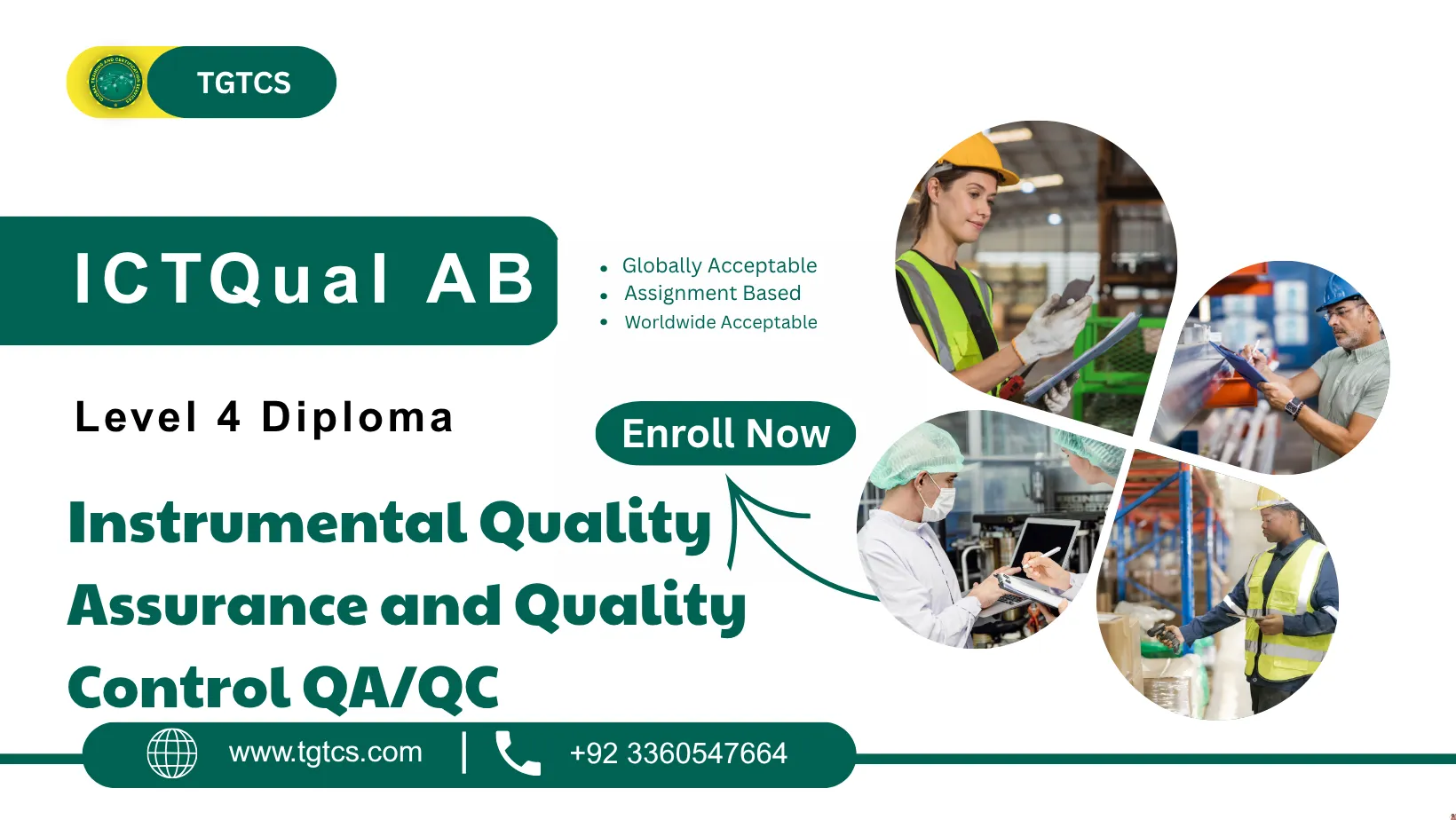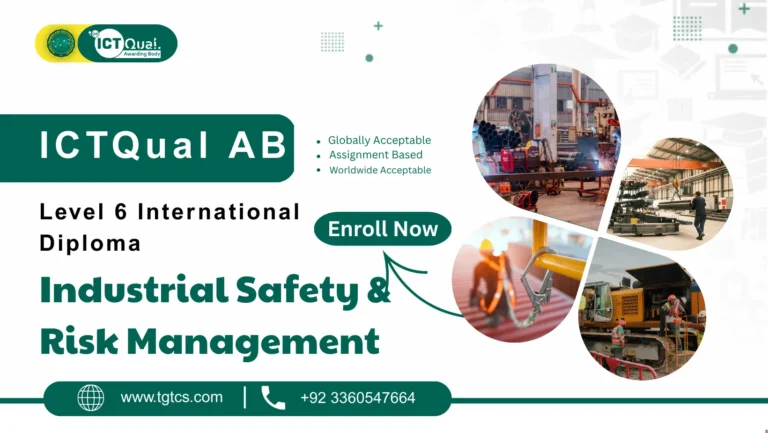ICTQual AB Level 4 Diploma in Instrumental Quality Assurance and Quality Control QA/QC
The ICTQual AB Level 4 Diploma in Instrumental Quality Assurance and Quality Control (QA/QC) is an intermediate-level qualification designed for learners who seek to advance their understanding of industrial quality systems and instrumentation. Building on foundational QA/QC principles, this diploma introduces learners to more complex inspection techniques, regulatory frameworks, and the integration of quality control with automated systems. It is ideal for individuals aiming to take on more specialized roles in quality assurance across industries such as manufacturing, oil & gas, pharmaceuticals, and construction.
Throughout the course, learners engage with advanced calibration methods, precision measurement tools, and documentation practices aligned with international standards like ISO, ASTM, and API. The curriculum emphasizes the importance of compliance, traceability, and continuous improvement in industrial processes. Learners also explore the role of instrumentation in maintaining product integrity, process reliability, and operational safety, gaining practical experience through hands-on training and real-world scenarios.
By completing the ICTQual AB Level 4 Diploma in Instrumental QA/QC, graduates are equipped with the skills and credentials needed to pursue supervisory or specialist roles in quality control departments. The qualification enhances professional credibility and opens pathways to higher-level certifications or engineering-focused programs. Whether upgrading from a Level 3 diploma or entering the field with technical experience, this course provides a robust platform for career growth and industry recognition.
The Global Training and Certification Services is Approved Training Centre of ICTQual AB UK Ltd
Course Level and Credits
The ICTQual AB Level 4 Diploma in Instrumental Quality Assurance and Quality Control (QA/QC) is an intermediate-level qualification designed to build upon foundational QA/QC knowledge. It carries credits that support professional advancement and academic progression in industrial quality systems.
Mode of Study
The course is delivered through a blended learning approach, combining classroom instruction, hands-on practical training, and self-paced study modules. This flexible format allows learners to engage with advanced QA/QC concepts while balancing work and study commitments.
Global Recognition & Attestation
This diploma is internationally recognized and can be attested by relevant authorities for employment and academic use across borders. It meets global vocational standards, making it a valuable credential for professionals seeking international career opportunities.
Scope and Purpose
The course is designed to prepare learners for specialized and supervisory roles in industrial QA/QC departments. It focuses on advanced inspection techniques, regulatory compliance, documentation standards, and the integration of quality control with automated instrumentation systems.
Skills and Knowledge Gained
Learners develop expertise in calibration procedures, precision measurement, technical reporting, and quality audits. They gain a deeper understanding of international standards such as ISO and ASTM, and learn to manage QA/QC processes in complex industrial environments.
Career Benefits
Graduates are qualified for roles such as Senior QA/QC Technician, Quality Supervisor, or Compliance Coordinator. The diploma enhances professional credibility, supports career progression, and provides a strong foundation for further study in quality management or engineering disciplines.
Mandatory Unit
This qualification, the ICTQual AB Level 4 Diploma in Instrumental Quality Assurance and Quality Control QA/QC, consists of 6 mandatory units.
- Developing and Applying ITPs in Instrumentation Projects
- Inspection Checklists and Documentation for Compliance
- Material Receiving, Handling, and Preservation Procedures
- Application of NEC‑250 Grounding and NEMA VE‑1/VE‑2 Cable Tray Standards
- Installation Practices for Conduits (RMS, FMT, RGS, IMT – NEC Articles 344–400)
- Intermediate Loop Checking, Testing, and Commissioning Techniques
Learning Outcomes for the ICTQual AB Level 4 Diploma in Instrumental Quality Assurance and Quality Control QA/QC:
1. Developing and Applying ITPs in Instrumentation Projects
- Explain the purpose and structure of Inspection Test Plans (ITPs).
- Develop ITPs tailored to instrumentation projects.
- Identify inspection stages and assign responsibilities within an ITP.
- Apply ITPs to monitor compliance with project specifications.
- Integrate ITPs with project schedules and QA/QC documentation.
- Evaluate the effectiveness of ITPs in ensuring quality outcomes.
- Revise and update ITPs based on project changes or non‑conformances.
- Demonstrate the ability to communicate ITP requirements to project teams.
2. Inspection Checklists and Documentation for Compliance
- Design inspection checklists for different stages of instrumentation projects.
- Apply checklists to verify compliance with technical standards.
- Record inspection findings accurately and systematically.
- Identify non‑conformances and document corrective actions.
- Maintain traceability of inspection records for audits.
- Use checklists to support quality assurance and risk management.
- Ensure documentation meets international QA/QC requirements.
- Demonstrate effective reporting and communication of inspection results.
3. Material Receiving, Handling, and Preservation Procedures
- Inspect incoming materials against purchase orders and specifications.
- Verify material certificates and compliance documentation.
- Apply correct procedures for safe receiving and handling of materials.
- Implement preservation methods to protect sensitive instrumentation equipment.
- Identify and report non‑conforming materials.
- Maintain traceability of materials throughout the project lifecycle.
- Ensure compliance with international best practices for storage and preservation.
- Document material inspections and preservation activities accurately.
4. Application of NEC 250 Grounding and NEMA VE 1/VE 2 Cable Tray Standards
- Interpret NEC 250 grounding requirements for instrumentation systems.
- Apply NEMA VE‑1/VE‑2 standards for cable tray design and installation.
- Inspect grounding systems for compliance with safety standards.
- Verify cable tray installations against NEMA specifications.
- Identify common grounding and cable tray installation faults.
- Document inspections in line with NEC and NEMA requirements.
- Ensure installations meet safety, reliability, and compliance standards.
- Communicate findings and corrective actions effectively.
5. Installation Practices for Conduits (RMS, FMT, RGS, IMT – NEC Articles 344–400)
- Interpret NEC Articles 344–400 for conduit installations.
- Select appropriate conduit types (RMS, FMT, RGS, IMT) for specific applications.
- Inspect conduit installations for compliance with NEC standards.
- Identify and correct common conduit installation issues.
- Apply QA/QC procedures to conduit routing and support systems.
- Document inspections and ensure traceability of conduit work.
- Ensure conduit installations meet safety and operational requirements.
- Demonstrate compliance with international best practices.
6. Intermediate Loop Checking, Testing, and Commissioning Techniques
- Explain the purpose of loop checking in instrumentation systems.
- Perform loop checks to verify continuity and functionality.
- Document loop check results in accordance with QA/QC requirements.
- Conduct intermediate testing procedures for instrumentation systems.
- Apply commissioning techniques to ensure system readiness.
- Identify and resolve issues during loop checking and commissioning.
- Ensure compliance with international standards during commissioning.
- Contribute to safe and effective handover of commissioned systems.
The ICTQual AB Level 4 Diploma in Instrumental Quality Assurance and Quality Control (QA/QC) is designed to elevate learners into more specialized and supervisory roles within industrial quality systems. This course blends technical instrumentation expertise with advanced quality control practices, preparing individuals to lead QA/QC operations across diverse sectors.
Enhanced Technical Proficiency
- Operate and calibrate advanced quality control instruments with precision
- Apply inspection techniques to complex industrial processes and products
- Interpret detailed technical specifications, standards, and compliance documents
- Conduct root cause analysis and implement corrective actions
- Maintain and verify calibration records and quality documentation
Regulatory Compliance and Standards
- Understand and apply international standards such as ISO, ASTM, and API
- Prepare documentation for audits, inspections, and regulatory reviews
- Monitor production processes to ensure adherence to quality benchmarks
- Support implementation of quality management systems (QMS)
- Ensure traceability and accountability in QA/QC procedures
Supervisory and Reporting Skills
- Lead QA/QC teams in inspection, calibration, and documentation tasks
- Communicate findings and quality reports to management and stakeholders
- Train junior technicians on quality protocols and instrumentation use
- Coordinate with production and maintenance departments for quality assurance
- Manage quality-related projects and timelines effectively
Career Advancement and Industry Relevance
- Qualify for roles such as Senior QA/QC Technician or Quality Supervisor
- Enhance employability in high-demand sectors like oil & gas, pharmaceuticals, and manufacturing
- Gain a recognized credential that supports career progression and global mobility
- Build a foundation for further study in quality engineering or industrial management
- Meet employer expectations for certified quality professionals
Professional Growth and Confidence
- Develop a proactive mindset focused on continuous improvement
- Gain confidence in managing complex quality systems and documentation
- Cultivate leadership and decision-making skills in technical environments
- Experience the satisfaction of maintaining high standards and compliance
- Build pride in contributing to product reliability and operational excellence
Completing the ICTQual AB Level 4 Diploma in Instrumental QA/QC empowers learners with the advanced skills, leadership capabilities, and global recognition needed to thrive in quality-focused roles across industrial sectors.
The ICTQual AB Level 4 Diploma in Instrumental Quality Assurance and Quality Control (QA/QC) is ideal for learners who are ready to deepen their expertise and take on more responsibility in industrial quality systems. It suits individuals who value precision, compliance, and leadership in technical environments.
Experienced QA/QC Technicians
- Professionals with Level 3 qualifications or equivalent experience in QA/QC
- Individuals seeking to upgrade their skills for supervisory roles
- Technicians aiming to handle complex inspection and calibration tasks
- Those looking to lead quality teams and manage documentation
- Learners interested in mastering international standards and compliance
Vocational and Technical Graduates
- Graduates of electrical, mechanical, or industrial technology programs
- Learners aiming to specialize in quality control within industrial sectors
- Candidates preparing for roles in inspection, compliance, or quality audits
- Individuals seeking a globally recognized credential to enhance employability
- Those planning to pursue further studies in quality engineering or management
Production and Maintenance Personnel
- Workers involved in production or maintenance who want to expand into QA/QC
- Employees responsible for equipment calibration and process monitoring
- Staff aiming to improve documentation and reporting for audits
- Technicians looking to formalize their experience with a recognized qualification
- Individuals seeking to contribute more actively to quality assurance initiatives
Career Changers and Industry Entrants
- Professionals from related fields transitioning into quality control roles
- Individuals seeking stable, in-demand careers in industrial QA/QC
- Learners returning to education with a focus on applied technical skills
- Candidates looking for international opportunities in quality management
- People interested in contributing to product safety and regulatory compliance
Professionals Seeking Certification and Recognition
- Technicians with informal QA/QC experience who lack formal credentials
- Employees seeking certification for regulatory or employer requirements
- Individuals aiming to validate their skills for international employment
- Professionals preparing for leadership or documentation-focused roles
- Workers looking to enhance their resumes with a Level 4 credential
The ICTQual AB Level 4 Diploma in Instrumental QA/QC is designed for learners at various stages of their professional journey. It provides the technical depth, practical training, and global recognition needed to succeed in advanced quality assurance and control roles.
Course Overview
Course Level
Level 4
Course Units
6 Units
Credits
40






